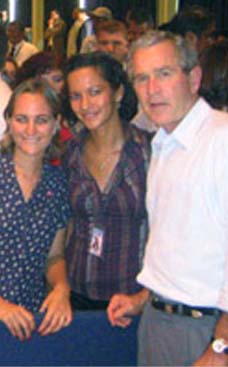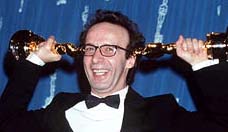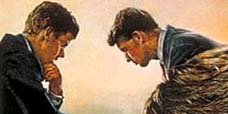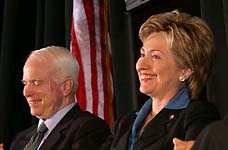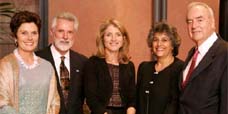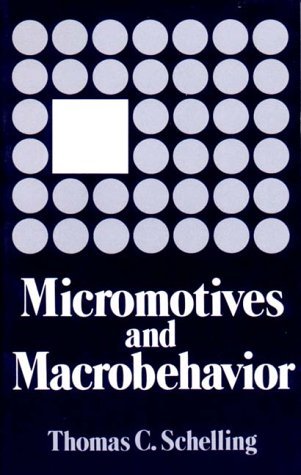
Schelling said his thinking over the years was influenced by formal study but also by observations of everyday life. Game theory, he said, was unknown to him when he first developed most of his major theories; he only later found that they fit into the game-theory concept.
"I think I learned as much watching my children interact with each other [as] I did, say, from reading Churchill," he said in an interview yesterday before the ceremony. "Among a lot of things, you see the process of negotiation, the value and proper and improper use of rewards."
Thomas C. Schelling wins Nobel Prize in Economics
Nobel winner savors honor
UM's Schelling is awarded prize in economics
By Todd Richissin
Sun Foreign Reporter
Originally published December 11, 2005
STOCKHOLM, Sweden // Forty-five years after publishing what became a textbook of sorts on how the United States and the Soviet Union could avert nuclear war, Thomas C. Schelling, professor emeritus at the University of Maryland, was formally awarded the 2005 Nobel Memorial Prize in Economic Sciences yesterday.
Schelling, 84, accepted his award from King Carl XVI Gustaf of Sweden and bowed to an elegantly dressed audience of about 1,600 people, who, by custom, stood and applauded his achievement and those of 10 other men awarded 2005 Nobel prizes in five categories.
"It has been exciting," Schelling said before the ceremony. "It has been an honor almost overwhelming."
Schelling became associated with game theory -- and gained prominence among economists and social-theory thinkers -- by applying it to issues raised by the Cold War, and by demonstrating the strategic importance of "commitment" in preventing war and diminishing disagreements of all kinds.
He was the first to argue that a party that makes its response to the decisions of others predictable can enhance the odds of diminishing the seriousness of a conflict. Further, he demonstrated that reducing the number of one's options in conflict can enhance the odds of success.
A mundane example of his theory is this: Two men are playing "chicken," driving their cars toward each other very fast to see which driver will swerve first. By pulling the steering wheel from its mount and holding it out the window for the other driver to see, a driver reduces his options but enhances the odds that the other driver will swerve first. An army that burns its bridges behind it as it approaches an enemy demonstrates that same kind of commitment, and similarly reduces its options, conveying the message that it will fight until the end without retreat.
Schelling has generally been reluctant to discuss how his theories apply to the war in Iraq. But before the awards ceremony, he suggested that the United States, seen through the lens of game theory, was mistaken in its strategic thinking -- that it did not seek to understand the reaction of the enemy and did not find a way to demonstrate commitment strongly enough to dissuade the United States' enemies, whether Saddam Hussein before the war or insurgent leaders now.
"What we are seeing in Iraq is the other side of using strategic thinking and commitment to diminish conflict," he said in the interview. "We are seeing in Iraq that the flip side can also be disastrous outcomes for all parties. I don't think we know for sure yet, but it sure doesn't look like there's going to be a satisfactory outcome for either side.
"This is the worst possible outcome when trying to solve a dispute -- there is no victor, no winner, no benefit to either side."
His writings about problem-solving note the limitation that comes from the involvement of human beings. Their predictions can be no more than that -- statements of what one party thinks will happen in a situation involving others.
Schelling's book The Strategy of Conflict, published in 1960, along with two others he published that decade, had a "profound effect on military theorists and practitioners in the Cold War era, played a major role in establishing 'strategic studies' as an academic field of study and may well have contributed significantly to deterrence and disarmament among the super powers," the Swedish academy said when the awards were announced in October.
Sweden long ago took the prizes to heart, and they have created what amounts to a weeklong celebration of intellectual achievement. Outside the Stockholm Concert Hall yesterday, thousands of people stood in bitterly cold temperatures for a glimpse of the winners as they arrived and departed.
Onstage, about 90 people sat in a semicircle of four rows graduated in height, broken in the center by the podium from which the winners were announced to the audience in the three-tiered hall. The king, wearing a tuxedo, sat next to his wife, Queen Silvia, who wore a flowing blue gown and a crown.
Four presenters spoke of the accomplishments of nine winners, and then Jorgen Weibull, a member of the Royal Swedish Academy of Sciences and chairman of the Economics Prize Committee, rose to address the accomplishments of Schelling and the man he shared the prize with for separate but related work, Robert J. Aumann, professor emeritus in the Institute of Mathematics at Hebrew University in Jerusalem.
"It is an honor and a privilege to convey to you, on behalf of the Royal Swedish Academy of Sciences, our warmest congratulations," Weibull said to Schelling and Aumann. "I now ask you to receive our prize from the hands of His Majesty the King."
Aumann, a citizen of both Israel and the United States, walked to center stage to accept his medal and diploma and was followed by Schelling, the final recipient of the night.
Schelling reached center stage, shook the right hand of the king while accepting the prize with his left, bowed to him, turned to the guests onstage and bowed to them and then turned to the audience, which was standing and clapping as trumpets played, first from behind the stage and then answering from the opposite end of the hall. He bowed to the audience, which included his wife, Alice, who has spent the week helping him navigate official events and interviews.
Officially, Schelling, who joined the University of Maryland in 1990 and retired in 2003, was honored with Aumann, "for having enhanced our understanding of conflict cooperation through game-theory analysis."
"Game theory" generally involves the analysis of the complexities and processes of one party's making decisions that can be influenced by the decisions of one or more other parties, as well as what is known about those parties and what can be surmised about decisions they might make.
Neither Schelling nor Aumann developed the theory. Aumann's honor was mainly for contributing to the theory and the understanding, primarily using mathematical formulas, to help explain economic conflicts such as price wars and trade wars.
Schelling said his thinking over the years was influenced by formal study but also by observations of everyday life. Game theory, he said, was unknown to him when he first developed most of his major theories; he only later found that they fit into the game-theory concept.
"I think I learned as much watching my children interact with each other [as] I did, say, from reading Churchill," he said in an interview yesterday before the ceremony. "Among a lot of things, you see the process of negotiation, the value and proper and improper use of rewards."
todd.richissin@baltsun.com








